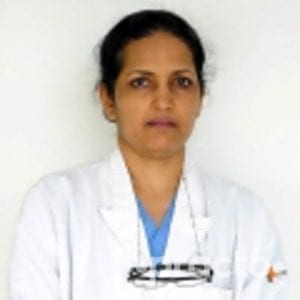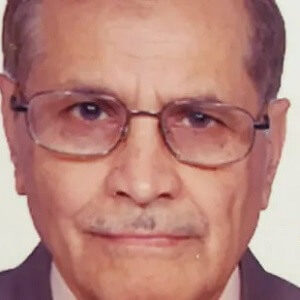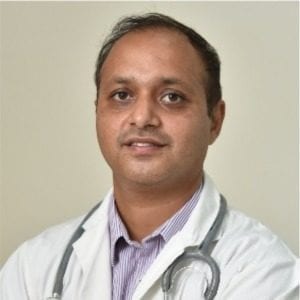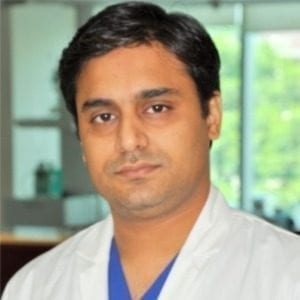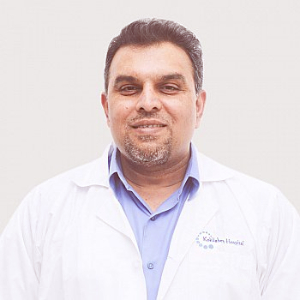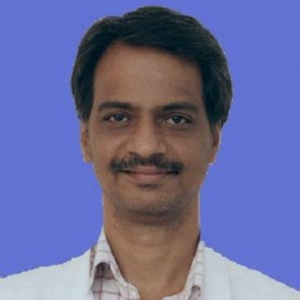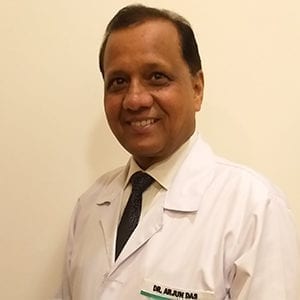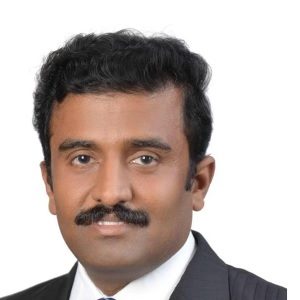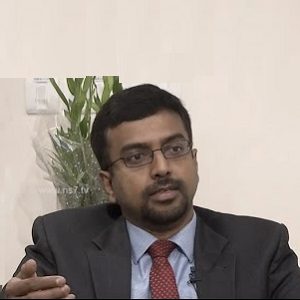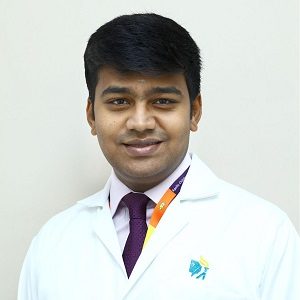Best Doctors in India for Mastoidectomy
- ENT surgeon, Gurugram, India
- Over 23 years’ experience
Profile Highlights:
- Dr. Aru Chhabra Handa is a famous ENT surgeon practicing in Medanta, Gurugram who is trained in oto-rhino-layrngology. She has expertise in treating pediatric ENT patients.
- Highly experienced in all kinds of routine and advanced surgeries of the ear, nose, and throat, she is also an expert in rhinoplasty, micro ear surgery, neuro ontological disorders, endoscopic nasal and sinus surgery, as well as phono surgery.
- Throughout her career of over 23 years, Dr. Aru Chhabra Handa has served in various reputed hospitals in North India. She has also treated several cases related to tonsillitis, epistaxis, pharyngitis, ear infection, voice and speech disorders, and throat cancer.
- She is known to be among the few ENT specialists in India, specializing in adult as well as pediatric cases. She has also taken up several complex cases in her career before she joined Medanta.
- Dr. Handa also has around 40 publications in several international and national journals as well as book chapters. She is also known for being a panelist and guest faculty in several CMEs, workshops, and conferences.
- ENT Surgeon, New Delhi, India
- Over 45 years’ experience
Profile Highlights:
- Dr. Dhingra is one of the best ENT surgeons in India with experience of over 45 years in the field.
- He is the senior consultant ENT with Indraprastha Apollo Hospitals, New Delhi. The veteran doctor is practicing in the area since 1965 and specializes in Ear, Nose, Throat, and Head & Neck Surgery.
- Dr. P L Dhingra has a special interest in ear surgery for alleviating deafness, endoscopic surgery of the nose and sinuses, and Microsurgery for voice disorders.
- Dr. Dhingra has held many prominent positions in his career; that included Medical Superintendent of the University College of Medical Sciences and GTB Hospital, Delhi.
- He penned many books, including a self-assessment manual; and articles in national and international journals.
- ENT, Head & Neck Surgeon, Gurugram, India
- Over 20 years’ experience
Profile Highlights:
- Dr. Shashidhar TB is known as an exceptionally talented, hard-working, and dedicated consultant for ENT, head and neck surgery who has years of experience in handling challenging cases.
- His interests include airway reconstruction, treating swallowing disorders, sleep apnea surgery, general ENT along with pediatric ENT. He has also been the runner-up in the International Pediatric Otolaryngology conference for Best Paper Award.
- ENT, Head & Neck Surgeon; Gurugram, India
- Over 15 years’ experience
Profile Highlights:
- Dr. Anish Gupta is a renowned ENT specialist and Head & Neck Surgeon in Delhi/ NCR.
- He has extensive experience in performing common and complex ENT procedures including ontological and rhinological procedures, laryngeal framework procedures, endoscopic sinus surgery, cochlear implant, thyroidectomy, and surgical treatment for head and neck tumors.
- Dr. Anish Gupta has been involved in more than 100 cochlear implant surgeries.
- ENT, Head & Neck Onco Surgeon; Mumbai, India
- Over 30 years’ experience
Profile Highlights:
- Dr. Sanjiv Badhwar is a well-known Head and Neck Onco surgeon in Mumbai.
- He specializes in head and neck surgery for cancer patients, cochlear implant surgery, robotic surgery to remove cancer of the head and neck region, voice disorder surgery, and other types of ENT surgeries.
- He holds an experience of over 30 years as an ENT specialist and has received advanced training from the Voice Institute in Portland, USA
- Surgical Oncologist, Hyderabad, India
- Over 20 years’ experience
Profile Highlights:
- Dr. Sharan Kumar Shetty is a renowned Head and Neck Surgical Oncologist in Hyderabad currently associated with CARE Hospitals.
- He has experience of over 20 years in the field and is an expert in the treatment of cancers affecting the head and neck regions such as the oral cavity, larynx, pharynx, trachea, sinus, salivary gland, nose, and throat.
- Dr. Sharan Kumar Shetty’s expertise also lies in reconstructive cancer surgeries using free flap and pedicled flaps.
- ENT surgeon, Chandigarh, India
- Over 25 years’ experience
Profile Highlights:
- A reputed ENT specialist in Chandigarh, India, Dr. Arjun Dass was affiliated with the Government Medical College & Hospital for several years.
- Dr. Arjun Dass diagnoses and manages ENT problems, and treats various conditions such as hearing loss, dizziness, allergies, certain throat and neck cancers, vertigo, etc.
- Surgical Oncologist, Head & Neck Surgical Oncologist; Chennai, India
- Over 18 years’ experience
Profile Highlights:
- Dr. Kannan S is a prominent Otorhinolaryngologist in India with nearly 18 years of experience.
- He holds a position as a Consultant Head and Neck Oncosurgeon in Apollo Cancer Institutes, Chennai.
- Being an MS and MBBS in Surgical Oncology, his interests led him to treat many ENT problems.
- He published several papers related to the same. He regularly attends conferences in his field and has also been awarded for his work.
- ENT Surgeon, Chennai, India
- Over 24 years’ experience
Profile Highlights:
- Dr. Venkata Karthikeyan is one of the top ENT specialists in Chennai, having an experience of more than 19 years in the field.
- Dr. Karthikeyan has expertise in treatments such as Laser Surgeries for Head and Neck Lesions, Head and Neck Cancer, Nasal Endoscopy, Cochlear Implants, Skull Base Surgery, Trans Oral Robotic Surgery, Trans Oral Laser Surgery, Neurotology and Skull base surgery, and Transoral Laser Surgery, etc.
- He has published research papers in reputed national and international peer-reviewed journals.
- ENT Surgeon, Chennai, India
- Over 11 years’ experience
Profile Highlights:
- Dr. Vikram is one of the best young ENT specialists in Chennai with a clinical experience of 11 years.
- He offers services such as Tinnitus Management, Throat and Voice Problems, Foreign Body in the Eyes, Ears, Nose, and Throat, Functional Endoscopic Sinus Surgery – FESS and Tongue Tie Release, etc.
- Dr. Vikram contributed many publications to the National and International Journals.
Best Hospitals in India for Mastoidectomy
Rela Hospital, Chennai
- City: Chennai, India
Hospital Highlights:
- RIMC is a multi-specialty hospital in a sprawling area of 36 acres located in Chromepet, Chennai, Tamil Nadu, India.
- The facility has 450 beds including 130 critical care beds, 9 operating rooms, modern reference laboratories and radiology services, and is conveniently located near road, rail and air transportation.
- RIMC is led and managed by world-renowned physicians committed to healthcare.
- RIMC offers the broadest range of clinical care, education, and research. The hospital offers state-of-the-art technology and modern treatment facilities designed to provide health care at an affordable cost.
- Rela Institute is driven by patient needs, comfort and confidence.
CARE Hospitals, Hyderabad
- City: Hyderabad, India
Hospital Highlights:
- CARE Hospitals were established in the year 2000, by CARE Group.
- The multispecialty hospital has 435 beds, including 120 critical care beds, with an annual inflow of 180000 outpatients and 16,000 in-patients.
- The hospital provides specialty medical services in Cardiology, Cardiothoracic Surgery, Pediatric Cardiology, Pediatric Cardiothoracic Surgery, Neurology, Neurosurgery, Nephrology, and Urology.
- The hospital has the first dual source, 128 slice CT scanner (for high precision cardiac imaging) – the first of its kind in south India.
- The hospital offers a wide range of accommodation facilities for the convenience of its varied patient base, ranging from general wards to super deluxe rooms.
Fortis Hiranandani Hospital, Mumbai
- City: Mumbai, India
Hospital Highlights:
- Fortis Hiranandani hospital was established in 2007.
- The hospital is an advanced tertiary care, multi-specialty hospital equipped with 149 beds.
- The hospital is equipped with a super ICU to provide emergency medical care to critically ill patients.
- The hospital is NABH accredited.
- The critical care facility in the hospital is augmented with the state-of-the-art facilities that facilitate speedier diagnosis and efficient monitoring.
- The hospital provides specialty medical services in cardiology, orthopedic science, pediatric science, neurology, diabetic care, urology, nephrology, ENT, obstetrics, gynecology, cosmetic surgery, bariatric surgery, neuro and spine care.
Fortis Hospital, Anandpur, Kolkata
- City: Kolkata, India
Hospital Highlights:
- Fortis Hospital, Anandapur, Kolkata is a world-class super-speciality equipped with the latest technologies in the medical world.
- The hospital is NABH accredited.
- This state-of-the-art facility specializes in cardiology and cardiac surgery, urology, nephrology, neurosciences, orthopaedics, digestive care, emergency care and critical care.
- The hospital, governed by integrated Building Management System (IBMS), has a pneumatic chute system, for quick vertical and horizontal transportation between floors, facilitating speedy transfer of patient specimens, documents, reports, and medicines to the concerned departments.
- The hospital also has a nephrology department with over 28 advanced dialysis units.
Fortis Hospital Banerghatta, Bengaluru
- City: Bengaluru, India
Hospital Highlights:
- Fortis Hospital Bannerghatta, Bengaluru was established in 2006.
- The hospital is a 276 bedded multi-specialty tertiary care facility.
- The hospital specializes in cutting-edge medical technology and dedicated patient care services.
- The hospital is equipped with state-of-the-art technologies like trans-radial angioplasty, trans-abdominal cardiac surgery, and computerized TKR navigation surgery.
- The hospital provides specialty medical services in cardiology, cardiac surgery, orthopedics, neurology, neuro-surgery, GI, and Minimal Access Surgery (MAS).
Fortis Hospital, Malar, Chennai
- City: Chennai, India
Hospital Highlights:
- Fortis Malar was established in 1992 and was formerly known as Malar Hospital.
- The hospital specializes in cutting-edge medical technology and dedicated patient care services.
- The hospital is multi-specialty, tertiary care facility with 180 beds.
- The hospital offers comprehensive medical care in specialties such as cardiology, cardio-thoracic surgery, neurology, neurosurgery, orthopedics, nephrology, gynecology, gastroenterology, urology, pediatrics, and diabetes.
Gleneagles Global Hospital, Parel, Mumbai
- City: Mumbai, India
Hospital Highlights:
- Gleneagles Global Hospital The 450-bed facility comprises of 17-stories, housing state-of-the-art infrastructure, and advanced medical care facilities.
- The hospital offers end-to-end clinical, surgical, and diagnostic services. It is equipped with a team of eminent medical professionals aided by qualified nurses and medical staff
- The Hospital offers advanced Endoscopic procedures, Hepatobiliary and Liver Surgeries, Surgical and Medical Gastroenterology, Bariatric Surgery, and Robotic surgery.
- The hospital is a center of excellence for Orthopedics, Joint Replacement, Knee Replacement, and Hip Replacement surgery.
Jaypee Hospital, Noida
- City: Noida, India
Hospital Highlights:
- Jaypee Hospital is the flagship hospital of the Jaypee Group.
- This hospital has commissioned 525 beds in the first phase and has been planned and designed as a 1200 bedded multi-specialty facility.
- It holds the accreditation of the NABH and NABL.
- The hospital has state-of-the-art infrastructure equipped with the latest technologies and modern equipment like 64 Slice PET CT, Dual Head 6 Slice SPECT CT, Gamma Camera, and Da Vinci Robotic Surgery for comprehensive robotic surgical solutions.
- It has special Centers dedicated to the major specialties to provide hassle-free and high-quality clinical care.
Manipal Hospital, Dwarka, Delhi
- City: New Delhi, India
Hospital Highlights:
- Manipal Hospitals, Dwarka, is a super-specialty hospital in Dwarka, New Delhi, which is a part of Manipal Hospitals Group.
- The hospital aims to provide the best treatment on par with international standards at a fraction of the cost.
- Equipped with 380 beds, the hospital is also one of the new age hospitals which are equipped fully with state-of-the-art infrastructure, cutting-edge technology as well as the latest and advanced clinical practices. The hospital also has 13 modular Operation theatres with 118 beds which are solely meant for critical care.
- The hospital comprises internationally acclaimed doctors and highly professional and experienced hospital and medical staff who are able to provide preventive, therapeutic, and diagnostic services all under one roof.
Paras Hospital, Gurugram
- City: Gurugram, India
Hospital Highlights:
- Paras hospital was established in 2006 and is the 250 bedded flagship hospital of Paras Healthcare.
- The is supported by a team of doctors of international and national repute.
- The hospital is NABH accredited and also the first hospital in the region to have a NABL accredited laboratory.
- The hospital provides specialty medical services in around 55 departments including Neurosciences, Joint Replacement, Mother & Child Care, Minimal Invasive Surgery, Gynecology and Obstetrics, Ophthalmology, Dermatology, Endocrinology, Rheumatology, Cosmetic and Plastic surgery.
- The hospital is equipped with state-of-the-art technologies.
Mastoidectomy
Mastoidectomy is a procedure for removing diseased mastoid air cells. The mastoid is part of your skull, located behind your ear. It’s filled with air cells which are made of bone and resemble a honeycomb. The diseased cells are generally caused by an ear infection that has spread into the skull.
The procedure is also used for removing an abnormal growth of the ear, a condition known as cholesteatoma. This surgery is not very common today, as antibiotics are used for treating infections. However, when antibiotics fail to provide results, surgery is an option.
Purpose
A mastoidectomy is generally performed for treating complications of chronic otitis media, a type of ear infection. These infections can lead to a complication of cholesteatoma, a skin cyst. This cyst can grow over time and lead to various other serious complications, which can include:
- Abscess in the brian
- Deafness
- Ongoing ear drainage
- Meningitis
- Labyrinthitis
- Dizziness
- Damage to the facial nerve which can lead to facial paralysis
A mastoidectomy can also be performed to put in a cochlear implant, a small, complex electronic device which can provide you with a sense of sound if you are profoundly deaf or severely hard of hearing.
This surgery can also remove abnormal growths at the base of the skull.
Types
Mastoidectomy is generally of various types, the main variations include:
- Simple Mastoidectomy- In this procedure, your surgeon opens your mastoid bone and removes all the air cells that are infected. Then he/she drains your middle ear.
- Radical mastoidectomy- In this procedure, the surgeon may remove your mastoid air cells, your eardrum, most of your middle ear structures as well as your ear canal. This procedure is generally considered when the mastoid disease is complicated.
- Modified radical mastoidectomy- This is a less severe form of radical mastoidectomy and it involves removing mastoid air cells along with only a few parts of the middle ear structures.
If you undergo radical or modified radical mastoidectomy, then you will most likely suffer from hearing loss.
Preparation
Procedure
First, the surgeon first makes a cut behind your ear, to access your mastoid bone. Then he/she uses a microscope and a small drill to open the mastoid bone. With the help of suction irrigation, he/she keeps the surgical area free of bone dust. Then the infected air cells are drilled out.
Once this is done, the surgeon will stitch the operated site, and cover it with gauze to keep the wound clean and dry.
During the surgery, your surgeon might be using a facial nerve monitor to help limit any injury to your facial nerve.
Recovery
You might experience numbness, discomfort as well as a headache after you regain consciousness. There will be bandages over your ear and stitches close to it.
Your doctor might prescribe you pain medication, antibiotics for treating any infection and ask you to schedule another appointment so that he/she can check the wounds and remove any bandages and stitches.
Your doctor should provide specific instructions regarding caring for your wound as well as when you are able to swim or bathe. Make sure you avoid all kinds of strenuous activity for at least two to four weeks afterward. Also, avoid putting too much pressure on your ear.
Risks and complications
Complications associated with mastoidectomy include:
- Facial nerve weakness or paralysis, a rare complication caused by facial nerve injury
- dizziness or vertigo, which can continue for many days
- sensorineural hearing loss, a type of inner ear hearing loss
- A change in taste that causes food to seem sour, metallic, or even off. This should resolve within some time.
- tinnitus, a condition where you might hear abnormal noises in your ears such as ringing, hissing or buzzing
Inform your doctor immediately if you experience any of these symptoms. If you have heavy ear bleeding or discharge or a fever over 38°C, or if the wound is not healing properly as it should, then you should inform your doctor as well.
Before you undergo the procedure, it is important to remember that hearing loss is common with modified radical and radical mastoidectomy.

